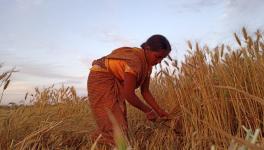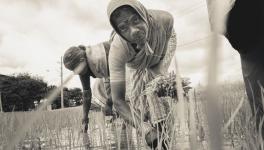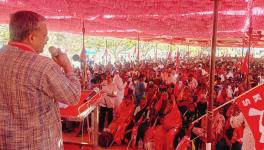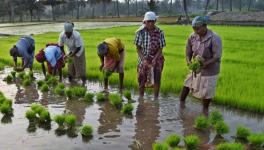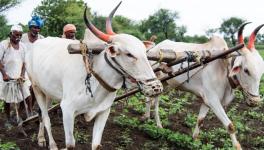Indian Sugarcane Farmers’ Protest Intensifies Ahead of Bolsonaro’s Visit
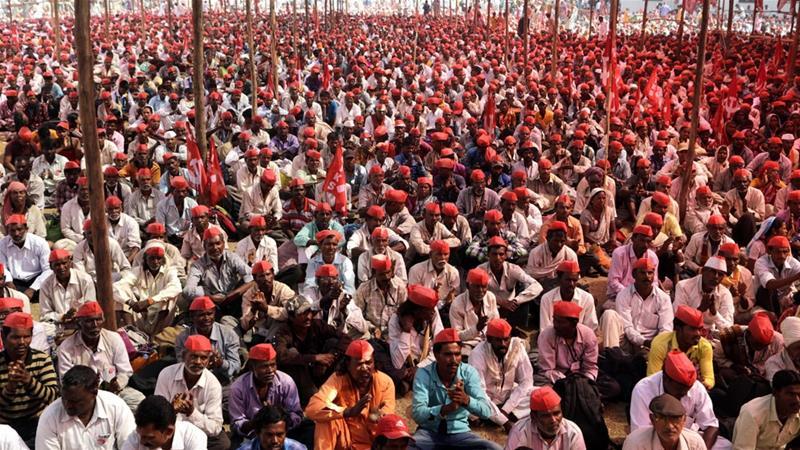
As the Brazilian president Jair Bolsonaro has been invited as the chief guest for the Republic Day celebrations on January 26, the peasants, especially sugarcane farmers, and farmers’ organisations across the country have launched a week-long campaign from January 18 to January 25 against his attendance.
Bolsonaro’s stand on the disputes over the Indian sugar subsidies which had been placed before the World Trade organisation (WTO) along with his repressive measures over the workers, peasantry, students, youth, students, women and the indigenous have irked the farmers and organisations. Condemning the BJP-led Modi government’s decision to invite Bolsonaro for the Republic Day, All India Sugarcane Farmers’ Federation (AISFF), which is affiliated to All India Kisan Sabha (AIKS), is leading the campaign against his policies.
“AISFF, AIKS, Swabhimani Shetkari Sanghatana and the like-minded organisations are protesting jointly against Bolsonaro’s visit. Crucial issue of the campaign and the protest is that the sugarcane price must be according to the Fair and Remunerative Price (FRP). And of course, his (Bolsonaro’) fascist ideology will also be highlighted,” said Ashok Dhawle, all-India president of AIKS.
Brazil, the world’s largest producer of sugarcane and exporter of sugar, challenged the support of Indian government to the sugarcane farmers across the country alleging that it violates the rules of the WTO and the domestic support is beyond the permissible limit. Along with Brazil, Australia and Guatemala have also lodged complaints against India. These countries allege that the subsidy from the Indian government to farmers distort the global sugar market.
The countries claim that India’s product-specific domestic support for sugarcane is in excess of its ‘de minimis entitlement’ of 10% of value of production under WTO provisions and India has no scheduled entitlements for giving export subsidies. Brazil has claimed that India has increased its FRP from Rs 1391.20/tonne in 2010-11 to Rs 2750/tonne in 2018-19 and the state-advised price (SAP) was also questioned.
According to AISFF, India’s FRP and the SAP have been challenged in addition to export subsidy measures due to the move of these countries. “While calculating Market Price Support (MPS) in the WTO regime, the External Reference Price (ERP) is still that of (export or import prices of) years 1986-88. Such an ERP was fixed at Rs 156.16 per ton at that time, and this is being compared with the current FRPs (Rs. 2750/ton) on sugarcane without accounting for inflation. Whereas, the deflated SMP/FRP is only around Rs 290.88/ton. India’s assistance of Rs. 55 Billion to support the sugar industry in 2018-19 was also a bone of contention,” said AISFF in a statement.
The ground reality of sugarcane farmers is, however, much worse than the narrative. The sugarcane farmers in India are not even getting the meagre prices, which ironically are termed Fair and Remunerative Prices. Along with this, the cane arrears are rising every season.
In India, the FRP is not being distributed to farmers directly by the government. The process of procurement occurs through the sugar mills. If we see the list of sugar mills, there are only 43 public sector mills out of the total 732. So, according to Kavitha Kuruganti of Alliance for Sustainable and Holistic Agriculture (ASHA-Kisan Swaraj network), “FRP is only an indicative floor price announced to protect farmers from exploitation by sugar mills, which mills are supposed to pay the supplier-farmers.”
“In MPS calculations, countries like Australia have used total production of sugarcane in India as ‘eligible production’ and claimed that our domestic support was 99.8% of value of production. Once again, the fact that the government does not pay the farmers any FRP has been ignored. In this entire discussion, it is worth noting that sugarcane itself is a non-tradable commodity in the international market,” Kuruganti added.
If the WTO rules against India, the Indian government will be unable to announce FRP or steps to protect exploitation of farmers by sugar lobby. Local production will fall and the country will be pushed into import of sugar and the already distressed farmers will face further distress as well.
On the other hand, Brazil sees, according to AISFF, India as an attractive market for sugar industry and access to this market would open up a potentially large export sector for it. As per FAO, Brazil exports 44.7% of sugar, followed by Thailand (15.1%), Australia (5.9%) and EU (5.9%). While India, despite being the second largest producer of sugarcane, exports only around 4%.
As farmers point out, if India loses the dispute, in the absence of the present support policies, the sugarcane sector, that employs over 50 million farmers and over 5,00,000 sugar mill workers may face an imminent collapse.
“The Narendra Modi-led BJP government, instead of protecting the interests of Indian farmers, is rolling the red carpet for the Brazilian president whose government is seeking to destroy the livelihoods of sugarcane farmers,” says AISFF.
Also read: Bolsonaro Issues Decree, Experts Warn that it Encourages Amazon Deforestation
Get the latest reports & analysis with people's perspective on Protests, movements & deep analytical videos, discussions of the current affairs in your Telegram app. Subscribe to NewsClick's Telegram channel & get Real-Time updates on stories, as they get published on our website.













